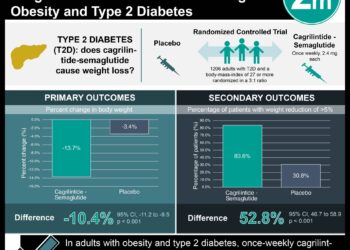Continuous glucose monitoring results in better glycemic control compared to conventional methods in patients with type 2 diabetes treated with basal insulin
1. Among adults with poorly controlled type 2 diabetes treated with basal insulin without prandial insulin, continuous glucose monitoring resulted in significantly lower hemoglobin A1c levels at 8 months when compared with conventional blood glucose meter monitoring.
2. Patients using continuous glucose monitoring also had significantly improved secondary outcomes including a higher mean percentage of time in the target glucose range, a lower mean percentage of time in the high-risk range, and a lower average of mean glucose values.
Evidence Rating Level: 1 (Excellent)
Study Rundown: Glucose monitoring is crucial for the safe and effective management of individuals with type 2 diabetes using insulin. Conventionally, glucose management based on blood glucose meter (BGM) monitoring has been the standard of care in individuals with type 2 diabetes using insulin and has been shown to be effective in treat-to-target trials and observational studies. More recently, real-time continuous glucose monitoring (CGM) in individuals with type 1 diabetes has demonstrated the potential to better inform diabetes management decisions compared to episodic self-monitoring via BGM by providing vital information such as glucose measurements every 5 minutes, hypo- and hyperglycemic alerts, and glucose trend information. However, the use of CGM in type 2 diabetes treated with basal insulin without prandial insulin has not been well studied. In order to evaluate the effectiveness of CGM in these patients, an 8-month randomized, multicenter, clinical trial was conducted comparing CGM with BGM monitoring in patients with type 2 diabetes treated with basal insulin without prandial insulin whose diabetes was being managed by primary care clinicians. The primary outcome measured was hemoglobin A1c (HbA1c) level at 8 months. Secondary outcomes included time in target glucose range (70 to 180 mg/dL), time with glucose level > 250 mg/dL, and mean glucose level at 8 months. Among 175 participants randomly assigned in a 2:1 ratio of 116 patients using CGM and 59 patients using traditional BGM monitoring, there was a significantly greater decrease in HbA1c level over 8 months with CGM (9.1% at baseline to 8.0% at 8 months; −1.1%) compared to BGM monitoring (9.0% to 8.4%; −0.6%). A limitation of this study was that the duration of follow-up was only 8 months and thus, it was unknown whether the high degree of CGM use and glycemic benefits could be sustained for a longer duration. A 6-month extension phase of the study may potentially provide more insights in this regard.
Click to read the study in JAMA
Click to read an accompany editorial in JAMA
In-Depth [randomized controlled trial]: This multicenter, randomized, open-label, parallel-group clinical trial was conducted at 15 centers in the United States with enrollment spanning from July 2018 to October 2019 and an 8-month follow-up period completed in July 2020. The study included adults with poorly controlled type 2 diabetes receiving their diabetes care from a primary care clinician and treated with 1 or 2 daily injections of long- or intermediate-acting basal insulin without prandial insulin, with or without noninsulin glucose-lowering medications. In total, 175 patients were randomized for glucose monitoring via CGM (116 patients) or BGM (59 patients). The mean [SD] age was 57 [9] years, where 88 were women [50%], 92 self-identified as individuals of racial/ethnic minorities [53%], and 165 (94%) completed the trial. At baseline, the mean [SD] HbA1c level was 9.1% [0.9%]. In the CGM cohort, the mean HbA1c level decreased from 9.1% at baseline to 8.0% at 8 months in contrast to 9.0% to 8.4% in the BGM cohort (adjusted difference, −0.4% [95%CI, −0.8% to −0.1%]; P = .02). For key secondary outcomes, the CGM cohort, as compared with BGM, yielded a higher mean percentage of CGM-measured time in the target glucose range of 70 to 180 mg/dL (59% vs 43%; adjusted difference, 15% [95%CI, 8% to 23%]; P < .001), a lower mean percentage of time at high-risk glucose range of greater than 250 mg/dL (11% vs 27%; adjusted difference, −16% [95%CI, −21% to −11%]; P < .001), and a lower average of mean glucose values (179 mg/dL vs 206 mg/dL; adjusted difference, −26 mg/dL [95%CI, −41 to −12]; P < .001). Lastly, severe hypoglycemic events occurred in 1 participant (1%) in the CGM cohort and 1 participant (2%) in the BGM cohort.
Image: PD
©2021 2 Minute Medicine, Inc. All rights reserved. No works may be reproduced without expressed written consent from 2 Minute Medicine, Inc. Inquire about licensing here. No article should be construed as medical advice and is not intended as such by the authors or by 2 Minute Medicine, Inc.







